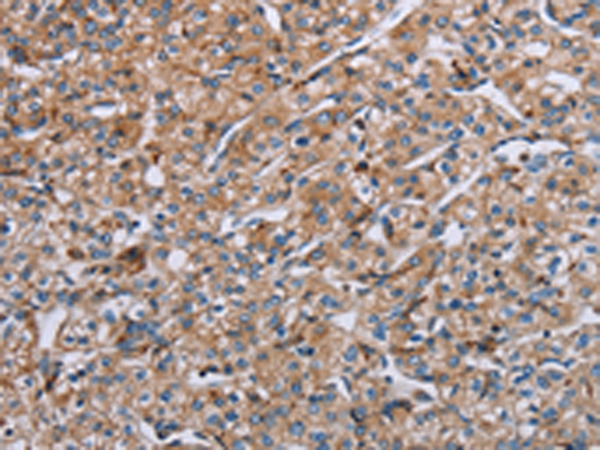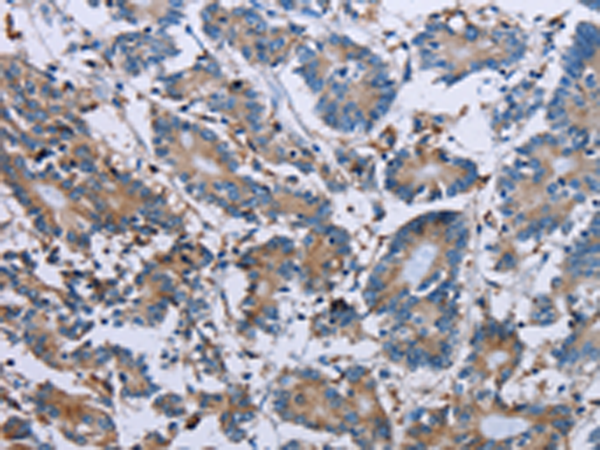


| WB | 咨询技术 | Human,Mouse,Rat |
| IF | 咨询技术 | Human,Mouse,Rat |
| IHC | 1/50-1/200 | Human,Mouse,Rat |
| ICC | 技术咨询 | Human,Mouse,Rat |
| FCM | 咨询技术 | Human,Mouse,Rat |
| Elisa | 1/1000-1/2000 | Human,Mouse,Rat |
| WB Predicted band size | 91 kDa |
| Host/Isotype | Rabbit IgG |
| Antibody Type | Primary antibody |
| Storage | Store at 4°C short term. Aliquot and store at -20°C long term. Avoid freeze/thaw cycles. |
| Species Reactivity | Human, Rat |
| Immunogen | Synthetic peptide of human PLG |
| Formulation | Purified antibody in PBS with 0.05% sodium azide and 50% glycerol. |
+ +
以下是3篇与PLG抗体相关的研究文献及其摘要概括:
---
1. **《Autoantibodies Against Plasminogen in Patients with Hereditary Angioedema》**
*作者:Dewald G, et al.*
摘要:研究报道了遗传性血管性水肿(HAE)患者体内存在抗纤溶酶原(PLG)自身抗体,可能与PLG基因突变导致的异常蛋白构象有关。这些抗体可能干扰纤溶系统的平衡,加剧血管通透性异常。
---
2. **《Anti-Plasminogen Antibodies Inhibit Tumor Cell Invasion by Blocking Urokinase-Mediated Plasmin Activation》**
*作者:Zhang Y, et al.*
摘要:该研究发现,靶向纤溶酶原的抗体可通过抑制尿激酶(uPA)介导的纤溶酶原激活,减少纤溶酶生成,从而阻断肿瘤细胞的细胞外基质降解能力,抑制癌症转移。
---
3. **《Plasminogen Autoantibodies in Systemic Lupus Erythematosus: Correlation with Thrombotic Events》**
*作者:Mendoza-Pinto C, et al.*
摘要:研究分析了系统性红斑狼疮(SLE)患者中PLG自身抗体的存在与血栓事件的关系,提示这类抗体可能通过干扰纤溶功能增加血栓形成风险,为疾病并发症的预测提供依据。
---
4. **《Therapeutic Targeting of Plasminogen in Atherosclerosis Using Neutralizing Antibodies》**
*作者:Li J, et al.*
摘要:实验证明,中和性PLG抗体可减少动脉粥样硬化斑块内炎症细胞浸润和基质降解,延缓斑块进展,为心血管疾病的抗体疗法提供了新思路。
---
以上文献涵盖了PLG抗体在遗传病、癌症、自身免疫病及心血管疾病中的机制与潜在应用。
**Background of Anti-Plasminogen (PLG) Antibodies**
Plasminogen (PLG), a glycoprotein synthesized in the liver, is a central component of the fibrinolytic system. It circulates as an inactive precursor and is converted to plasmin, an enzyme that degrades fibrin clots, facilitating thrombosis resolution and tissue remodeling. Dysregulation of plasminogen activation is linked to thrombotic disorders, bleeding tendencies, and inflammatory conditions.
Anti-PLG antibodies, autoantibodies targeting plasminogen, have been implicated in various pathologies. In autoimmune diseases like systemic lupus erythematosus (SLE) and antiphospholipid syndrome (APS), these antibodies may interfere with fibrinolysis, contributing to thrombotic events or recurrent pregnancy loss by disrupting plasmin-mediated processes. They are also observed in infections (e.g., streptococcal) where molecular mimicry may trigger autoimmunity.
Clinically, anti-PLG antibodies are detected via ELISA or immunoblotting. Their presence correlates with disease activity in some autoimmune conditions, though their pathogenic role remains debated. Research explores their utility as biomarkers for thrombosis risk or therapeutic monitoring. Treatment often focuses on managing underlying conditions, with anticoagulants or immunosuppressants considered in refractory cases.
Understanding anti-PLG antibodies highlights the interplay between coagulation, immunity, and inflammation, offering insights into novel diagnostic and therapeutic strategies for thrombotic and autoimmune disorders.
×